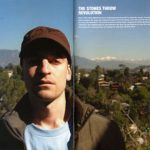If I were Madlib, I’d complete this cover story in less than 20 minutes. I’d quick-mix a few ill metaphors with some clever descriptors, not bother to edit out the few minor grammatical mistakes, and it’d still be hotter than Korean liquor stores during Los Angeles riots. Unfortunately for me and a slue of surplus rap producers, there’s just one Madlib.
Straight outta Oxnard, California, Otis Jackson Jr. is resident MVP (the “P’ for Producer, of course) at Stones Throw Records, the L.A.-based label small on size but big on the type of beats that make backpackers tighten their straps as they sprint to the local house of wax for the indies latest spinners.
Started by Peanut Butter Wolf in the mid-90s, Madlib has been to Stones Throw what Steve Nash is to the Phoenix Suns: the underdog that makes everyone around him better, turning what might seem like an average team into a squad that hustle harder and score more than franchises with payrolls ten times as large. Only difference is, where Nash assists on 3s, Madlib sets-up 12s.
“When I started the label,” explains PB Wolf, “it was really before I had met him, but I had no idea that I was gonna be dedicating so much of my time and energy to him. But it’s all worth it. He’s great at what he does, and he kinda gave us a new direction that nobody could’ve predicted.”
Indeed, predicting Madlib’s impact was impossible, precisely because his prolificacy is without precedent: the infamous Madvillainy LP with ex-KMD MF Doom, the Jaylib project with Rock City’s Dilla, the Yesterdays New Quintet albums, and of course the Quasimoto joints – the list of Madlib’s recent credits is “really endless,” in the words of the crushed-nut canine.
Only comparisons with the early days of the Wu seem appropriate, back when the RZA was sonically crafting classic discs like Southeast-Asian 11-year-olds turn out fresh kicks. But even then, Madlib has done more in less time.
“Madlib is pretty much the head of all of us in a way,” says Medaphoar (a.k.a. M.E.D.), a fellow Stones Throw Oxnardian whose moving debut, Push Comes to Shove, has Madlib written all over it. “Kinda like the RZA is the head of the Wu-Tang in a sense. I’m pretty sure they stay original because of the RZA-he’s so original. He’s got his own style, and he lays that foundation down like, ‘yo, we gonna sound like we original, we ain’t tryin’ to sound like no cats.’ And I think that’s what Madlib brought to all of us.”
With, according to Peanut Butter Wolf, “thousands of records at his disposal,” and using, in ‘Lib’s own words, “every type of world music” (he’s been around the world six times), Madlib has employed relatively simple technology to sample in the most complex of manners. “I’m just doing it for all the low budget cats to show you don’t need all that,” says Madlib of the high-tech options available to beat-takers nowadays.
Asked about his bread-and-butter’s production style, PB Wolf answers: “He just kind of proves that sampling could also be like paying music as well. And a lot of people say that sampling is not an art-form, but when you hear his stuff, it really is the best argument against that.”
PB also says that while at one time he adopted the same freestyle approach to production as Madlib, “for every beat I would make, he would make ten, twenty beats. He doesn’t have rules.”
As a result, there now exist mountains of as-yet unreleased Madlib material which may eventually reach the hungry. “I just do it from my heart,” says Madlib, ‘and then after that if I like it, then possibly it’s gonna come out.”
Although I arrive in Los Angeles with four days and what seems like plenty of time to interview Madlib, it isn’t until the late after- noon of my last day that he materializes for our meeting. When we’re finally introduced, I joke with him that I was beginning to think he might just live up to his alt-ego’s nickname: the Unseen. Madlib finds the remark amusing, chuckling with the slightest hint of guilt. Maybe it’s something in Oxnard’s water supply, or maybe it’s something you contract when you sign to Stones Throw, but the label’s artists seem rather disinterested in interview ops (even for hip-hop!). Both Madlib and MED. go MIA while I’m L.A. to interview them. Really, the episodes reflect a broader thematic operating at Stones Throw, a theme best expressed by the label head himself: “I was just more into having the music speak for itself,” says Peanut Butter Wolf.
Indeed, what Madlib lacks as an interviewee he more than makes up for with his art. As PB suggests, Madlib’s music speaks-through and in volumes. “We’re setting the path for our city a little bit,” says Medaphoar, relaying the results. “Madlib’s puttin’ it on the map.”
When I finally do sit down to speak with Oxnard’s most elusive, he has this to say ….
A friend of mine who’s really into beats and production said that Madlib’s proven: “it’s not about what you use, but what’s in you.” How do you feel you’ve proven that statement true?
It’s what’s in you but you also have to have a little musical knowledge, if you wanna do different styles and things. Basically however you chop your music up. People can have the same records, but it’s how you use your mind.
What do you like about the gritty sound you have that’s like old dub records, that makes you not want to update your technology?
‘Cause I started out doing tape edits and things, so that’s how I still make my beats, kinda raw. I mean, you’ll hear a couple of mess-ups or something, it’s not perfect. I have a human element to it. Everybody else’s stuff is like robotic, computerized, quantized. My music ain’t really quantized.
You’re the child of musical folk. How much of musical ability do you think is genetic, and how much do you think just came from your environment growing up?
It just depends on what your parents show you, what type of music. My parents showed me from like James Brown to Leontyne Price, or even like Steeley Dan, whatever. Different types of music. So it depends on what they put into you.
It seems like Shades of Blue is a gateway album to help hip-hop heads to get into jazz. Is that what you were trying to do?
Yeah, I used to listen to a lot of jazz records, and I know a lot of kids, and older cats listen to me too, so I was just trying to show them different sides. I know jazz as much as I know hip-hop or soul or rock or whatever. Just make people go look for them records, young kids. If I’m listenin’, then it’s ‘oh, let me go check for that or whatever.’ Whatever, older kids who thought it was just this way.
On Shades of Blues you had total access to Blue Note’s entire catalog for that remix project, and it seems you ended up picking more well known tracks. Some may have expected you to pick a few more obscure free-jazz records that would be as adventurous as your Tribute to a Brother Weldon album. Why did you pick those particular songs to remix?
Blue Notes didn’t have that many free jazz albums on the label… The stuff I picked was from the seventies, like the soul jazz, the stuff they don’t talk about in documentaries, that’s the stuff I picked. I didn’t pick the ’50s and ’60s. I picked the stuff they leave out in documentaries. The soul jazz stuff ’cause they act like that was dead.
Have majors come after you in recent times? And how much do, or would, early experiences such as the attempt to buy the Lootpack album for $3000 effect how you react to interest from major labels?
You’re talking about like ’91. That’s why my pops funded my first record, because we went to a lot of labels and they were like, ‘we pay Wu-Tang such and such, so you guys should take this and this.’ Nah. I’m doing better now than bein’ on a major.
You’ve said you like rapping the least and don’t like your voice as a rapper. How important has that feeling been in allowing you to try crazy experiments like working with Quasimoto?
That’s why that’s out, Quasimoto, ’cause like ’96, cats called me Barry White. You know what I’m sayin’, I ain’t tryin’ to be no Barry White. I just picked the voice up, and that was one of my best-sellin’ records. Just playin’ around.
I heard a rumor that some guy was going around, trying to perform, saying he was Quasimoto. Is that true?
Yeah, yeah, I think he made some money. He did a few shows, fooled some people, promoters. That’s why you ain’t see a Quasimoto show since.
And how can people spot a Quasimoto impostor?
Quasimoto is the Unseen, so how you gonna be seein’ Quasimoto at a show?
MF Doom said he felt like he was in a race with you to create alter-egos, but that you had the jump. Do you have anything in mind in case he catches up?
I’m not tryin’ to race, I’m just trying to make a gang of albums, that’s all. Alter-egos I’m not really into. It’s just I put it on if I don’t want my name out there. Switch it up, confuse people.
I’m gonna name some producers, and tell me what you think their most important contributions have been to the production game … Dr. Dre
He’s the king of the west coast, basically. He’s been doing it since the early 80s. If you remember, if you follow his stuff correctly. People think he started in the 90s or something. He was doing this at swap meets before.
DJ Muggs
Even though he’s made millions, he’s still slept-on like in certain aspects. He’s one of the first that made me wanna get an SP-1200, with [those] gritty beats he had.
DJ Quik
Another classic west coast producer. He’s doing his thing.
PB Wolf
He sucks. Peanut Butter what? [Laughs] Nah, he need to come out with a new record!

